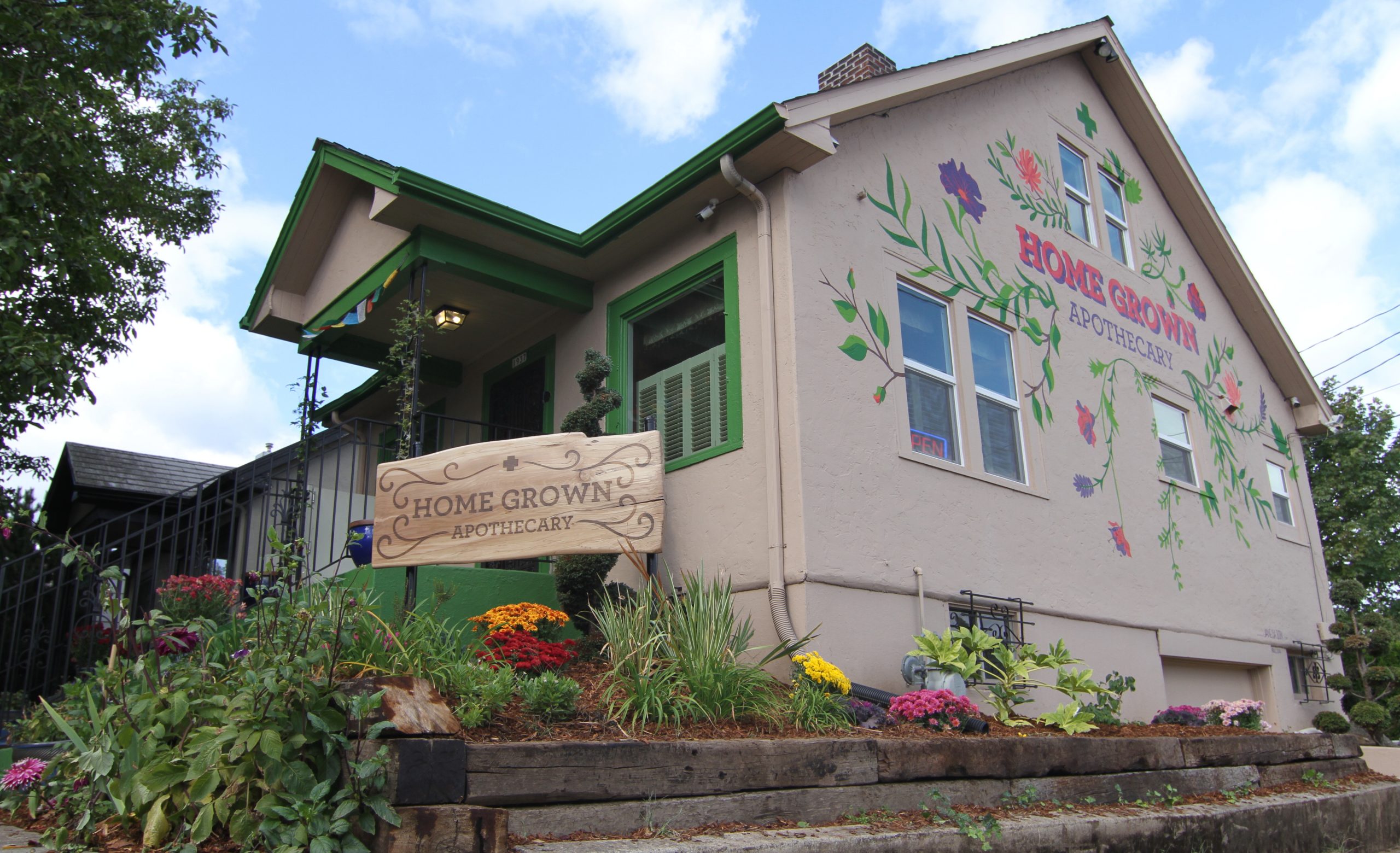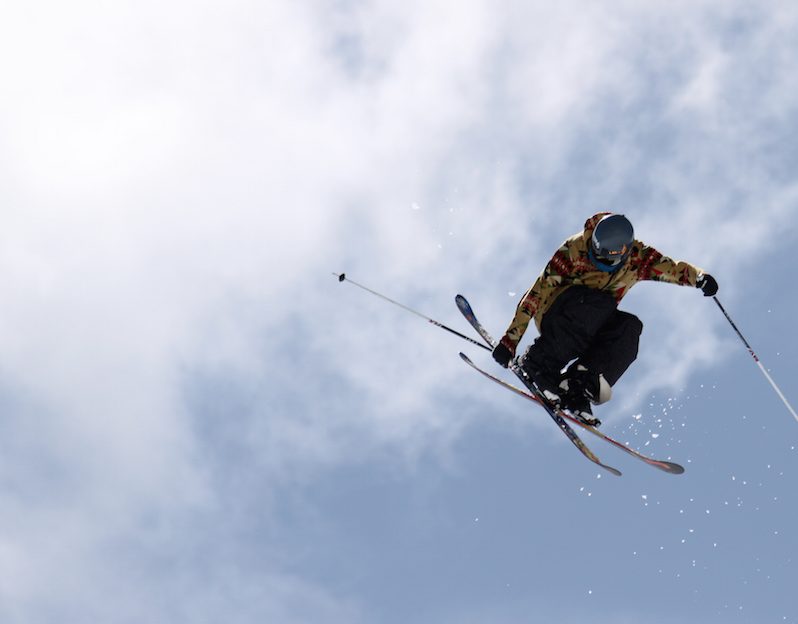Randa Shahin and Josh Larkin make an excellent team. They’ve been together for about five years now, and they are well known on Mount Hood for their snow skills, their adventure dog Shiva, and their high-flying jumps.
Randa is a top-notch snowboarder who coached at Windells for years and recently took second place in the Revelstoke Freeride Open. Josh grew up in New Hampshire slicing ice and launching off massive ski jumps free-heel. He and Tommy Ellingson have built some of the largest jumps ever seen on Mount Hood.
Josh and Tommy and their Homegrown crew produced a film highlighting their adventures that premiered in November of 2013 with free beer, live music and a huge crowd of Mount Hood enthusiasts. Josh even created a clothing company to sponsor the event, Solution Clothing.
The film premiere party was a success, and Solution’s locally-made hoodies and vests sold well. But it didn’t translate into a steady flow of income. It is no simple task to build a Made-in-Oregon brand into a steady business when competing with low-cost imports from China. Nor is it easy to make a living in the snow sports industry. Sponsorships come and go, and they tend to involve boards and goggles as payment rather than cash. Plus it can be risky. Randa overshot a huge jump at Timberline at a sponsors event in June of 2008 and crashed badly, breaking the same vertebrae in her neck that Christopher Reeves broke. “I should have been paralyzed,” she says. She had to wear a spine halo for four months but fortunately recovered without lasting damage.
After years in the mountain life, Randa and Josh found themselves looking outside of the winter sports industry for a new business opportunity with long-term potential. Some sort of product that retails for, I don’t know, $4500 per pound.
Like, say, weed.
‘The Last Good Deal in Portland’
Two years ago, no one was selling legal marijuana in Portland. Then a statewide citizens initiative passed, the rules changed, and cannabis entrepreneurs rushed to open shops and compete for customers. A lot of the new shops are fairly dingy-looking and tacky, but Homegrown Apothecary stands apart with its big, cheerful mural, its welcoming vibe and its tastefully decorated interior.

Randa jumped on the first place she could afford and got what she calls “the last good deal in Portland” in February of 2014 on a run-down building at NE 20th and Pacific near I-84. She and Josh redid the interior, hired their artist friend Janessa Bork to create a colorful mural, and eventually transformed a bland building into an eye-catching space with a compelling name: Homegrown Apothecary. I noticed the mural right away because I live a few blocks away. I remember riding past wondering, Homegrown? Is this related to the stuff Josh was working on? Turns out it was.
Josh and Randa worked long hours, got the necessary permits, placated city officials with a $17,000 wheelchair lift for equal access, navigated the legal morass of two separate regulating agencies (one for recreational weed, the other for medical marijuana) and finally opened for business in September of 2015, selling marijuana under liberalized if confusing Oregon laws. The money started rolling in, and before long they were hiring and struggling to keep up with demand.
Randa runs the retail end of things. Josh is the farmer, feeding the shop with a steady supply of Girl Scout Cookies, Gorilla Glue, Strawberry Cough and other varieties of cannabis. He grew for medical patients for years before it was legalized recreationally in Oregon.
After much hard work, business has been brisk if legally complicated at their new shop in inner Northeast Portland, and they are well-positioned in a promising niche as attitudes and laws evolve.
Detained at the Border
Homegrown is a small empire, but it is growing, and it is vertically integrated. Everything Josh and his team grow on the mountain, Randa and her team sell in Portland, in a building that they own. Randa employs two people full-time and four part-time at the shop. Josh has a full-time employee out at the farm and a few part-timers who help with trimming.
They clone, plant, grow, harvest and store aromatic organic buds in a converted garage with high-intensity lights. They also have a shipping container that they bought on craigslist for $2,075. Their farm is on a remote property near the Sandy River, and they move their product to market by driving to town.
Marijuana is legal in the City of Portland, Multnomah County and the State of Oregon, but it remains illegal in the United States. Marijuana entrepreneurs are not welcome at federally insured banks, and they don’t get to write off their cannabis expenses to the IRS. All transactions are in cash, including payroll. “Cash bookkeeping is a nightmare” says Randa.
Imagine running a business with no money transfers, no checks, no plastic. Randa and Josh recently finished filing six separate tax returns with help from Randa’s mom, who is a Certified Public Accountant. They were penalized for not filing electronically, but they couldn’t file electronically because they don’t have a bank account for their business.
In case they needed more evidence that their business is in a tricky position legally, they got it when Josh was detained at the Canadian border during their Revelstoke trip for smelling like cannabis. He was held for a while and ultimately released with a suspended license.
‘We fought through it’
Under advice from their attorney, Randa and Josh are considering changing their business to a consulting firm “doing business as” an apothecary. That might enable them to open a business bank account, stop hauling around large sums of cash and earn income by sharing their expertise.
They are also applying for a recreational marijuana license that will require “land use compatibility” approval from the City of Portland. If they succeed in getting that license, they will be in a very strong position. If not, they will still be able to sell medical marijuana.
Josh, a non-drinker, started smoking marijuana at the age of 16 and hid it from his family for years before finally coming out into the open about his daily routine. He questions the claims of negative health effects of marijuana, and looks forward to future research into potential health benefits as a changing legal landscape enables new studies. “They’ve been telling us how bad it is for the past 100 years,” Josh says. “Now it’s our turn for the next 100 years to show that it’s good.”
Even with all the legal complications and challenges, the weed business has been good to Josh and Randa. Among other things, pot sales are funding Randa’s continuing participation on the Free Ride Tour, with upcoming competitions at Taos, Crested Butte and Crystal Mountain.
As with launching off large jumps, the flight of entrepreneurship comes with risk. But the pay-off can be sweet. “Opening any business is a ton of work,” says Randa. “It was beyond dedication and working seven days a week non-stop. It’s definitely been a challenge, but we fought through it.”
Last modified: February 15, 2016

